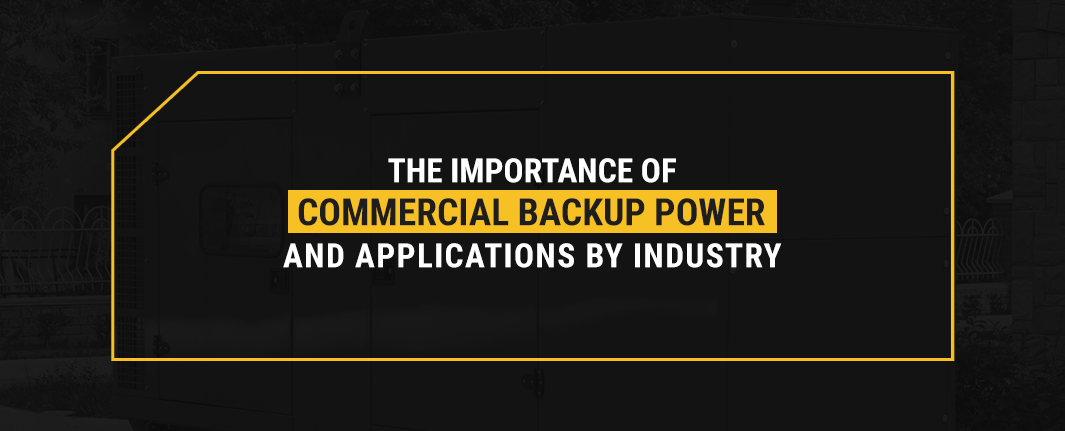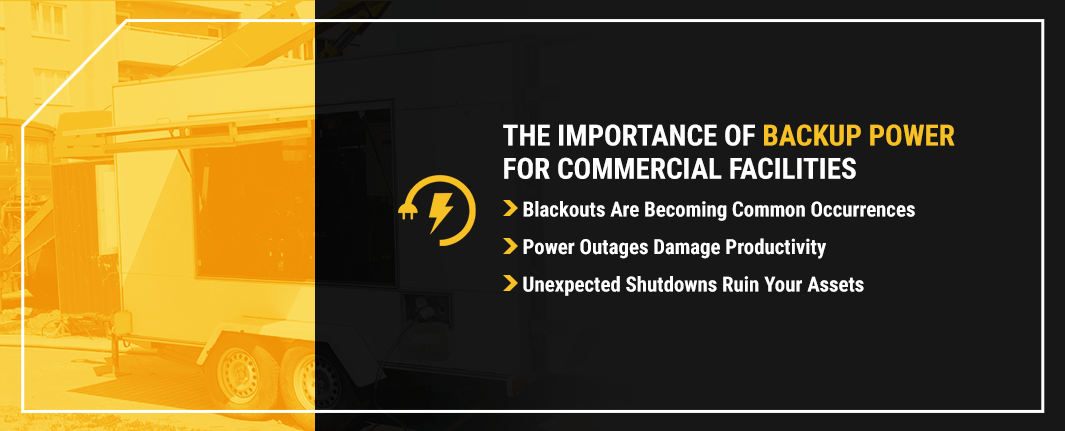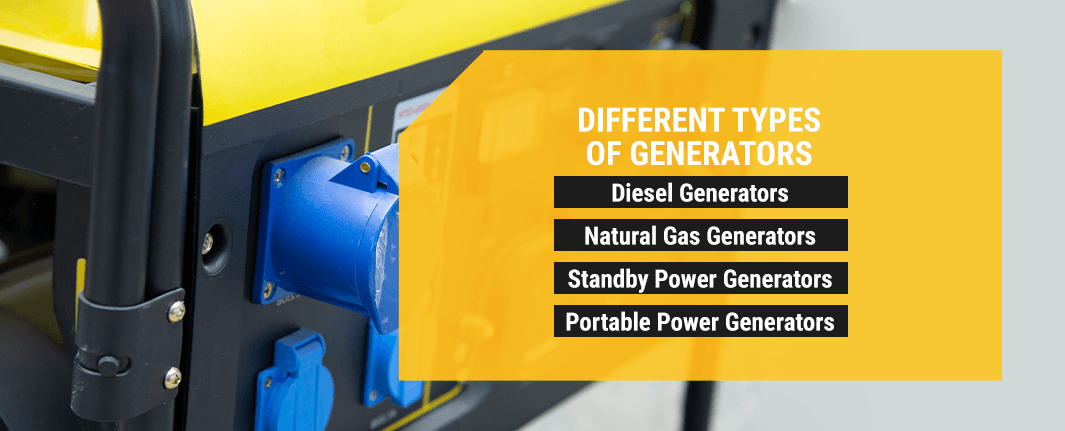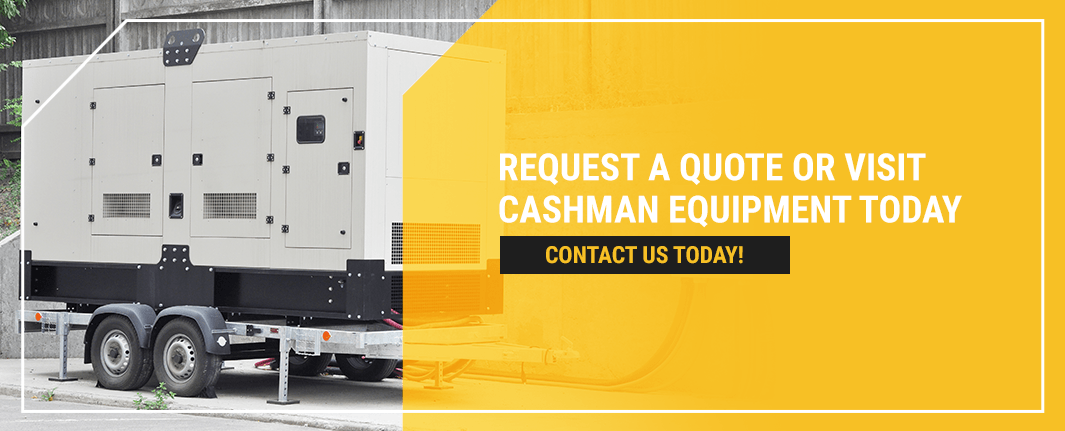Applications of industrial generators span many sectors and companies. Any business from a small store to a large university can use a generator to maintain safety and remain operational through a power outage. Other companies require backup generators because of government regulations or industry best practices. Any business that can benefit from fewer interruptions can use a commercial generator.
The Importance of Backup Power for Commercial Facilities
No matter your industry, a backup power supply can be critical. A power outage at the wrong time — or any time — can severely impact your productivity or disrupt critical operations. In some businesses, this can mean substantial financial losses. For others, it endangers people’s lives. Here’s why a backup generator is crucial for businesses like yours:
1. Blackouts Are Becoming Common Occurrences
Have you noticed power outages are happening more often than they used to? It’s not just you. Major outages affecting more than 50,000 homes or businesses have become 10 times more frequent from the mid-1980s to 2012. From 2003 to 2012, weather-related outages have doubled. Changing weather patterns and an aging utility infrastructure strain the national power grid.
Besides falling trees and other weather-related incidents, the power might go out because of a surge in demand. While the grid has gradually improved its load capacity, it’s not keeping pace with the homes and businesses it serves. A heatwave can overload an area’s power supply as people turn up the air conditioning. We’ve experienced that firsthand here in Nevada. A recent heatwave provoked the state’s largest utility company to request customers to decrease their energy usage to prevent widespread outages.
Power companies’ mismanagement and human errors can also cause power outages.
2. Power Outages Damage Productivity
Longer, more frequent outages are becoming the new normal across the country, but they don’t have to be long to hurt your business. Even an hour of downtime costs you money. For some companies, a power outage means being unable to use any office equipment. For others, it means operations shut down entirely. A manufacturer can’t make its products, a store can’t make sales, and a data center can’t operate its servers.
Some businesses lose clients and sales opportunities. Others must pay salaries for the time when workers couldn’t be productive. Blackouts deal a major blow to your business’s productivity. You may fall behind schedule, and your team will be forced to play catchup when the power comes back on.
3. Unexpected Shutdowns Ruin Your Assets
Besides the lost productivity, you could also lose significant assets, whether intellectual property or merchandise. If a restaurant or grocery store loses power, the freezers and refrigerators stop working, and all the food begins spoiling. A data center will lose critical data if its servers shut down unexpectedly. Any office could lose the documents its team was currently working on when the outage struck.
Different Types of Generators
The different types of commercial generators available span many fuel sources, load capacities and uses. Learn more about them below:
1. Diesel Generators
Diesel is the most familiar fuel source for commercial standby generators. The fuel is less explosive and flammable than gasoline, which makes it much safer. Diesel also makes the generator more durable since it burns at a low temperature, reducing engine burden. As a result, these generators have a longer life span and need less maintenance.
Diesel generators are also incredibly fuel-efficient, producing a higher energy density. These features make diesel generators incredibly affordable for most commercial applications. These machines are also quite reliable since diesel is abundant and can be stored on-site.
On the downside, diesel prices are unpredictable. Diesel generators also release carbon and other emissions that harm the environment and pollute the air. In cities that must regulate their air quality, it may be harder to implement a diesel generator.
2. Natural Gas Generators
Natural gas is a newer fuel source that’s highly efficient and growing in popularity for many reasons. First, it burns much cleaner and quieter than diesel or any other fossil fuel. This is good for the environment and the generator engine. When the fuel burns cleanly, less maintenance is required. Natural gas is delivered to most commercial generators through the natural gas pipeline from your utility company. This means you don’t have to store it on-site. Also, natural gas is generally affordable and has a stable, predictable price point.
While they offer many benefits, natural gas generators won’t last as long as their diesel counterparts. They can also have higher installation costs since they need to connect to the natural gas pipeline. Another downside is natural gas is highly flammable, even more so than gasoline. If any gas leaks from the system, it’ll be highly explosive.
3. Standby Power Generators
Standby generators are ready to kick on whenever the power goes out. They are permanently wired to a building’s electrical system. When they detect power loss, they use an automatic transfer switch to power on in seconds. They can run on either diesel or natural gas. When they run on diesel, they connect to a storage tank providing at least 48 hours’ worth of power. No matter the fuel, they can provide days of continuous operation without wearing out or shutting down.
Many buildings have a legally required standby generator. These systems must power emergency lights, elevators, and safety systems like fire alarms. Many commercial businesses also use a standby generator to power their daily operations during an outage. These machines provide continuous power without frequent refueling.
However, standby generators can get costly when compared to your regular utilities. Some businesses power only their most essential equipment during an outage to reap some cost benefits. A standby generator also needs routine maintenance so it’ll be ready to go in a crisis.
4. Portable Power Generators
Besides offering backup power, one of the most common industrial generator uses is providing mobile electricity. Commercial portable generators are different from residential portable models. In commercial applications, a portable generator can handle high power loads and run for long durations. These generators also have wheels or attach to trailers.
They’re used for construction and other applications requiring both small and large amounts of mobile power. As an example, agricultural facilities use them to power harvesting equipment. Mining companies use them to power lights and equipment below ground. Construction companies use them for temporary power needs for building and testing. Events use them for powering up the tents, lighting, and more.
Commercial Backup Generator Applications by Industry
Practically any business, big or small, can benefit from backup generators. These machines provide the reliability the utility company can’t, which is why there are so many common commercial generator uses across industries. You’ll find standby backup generators in businesses such as:
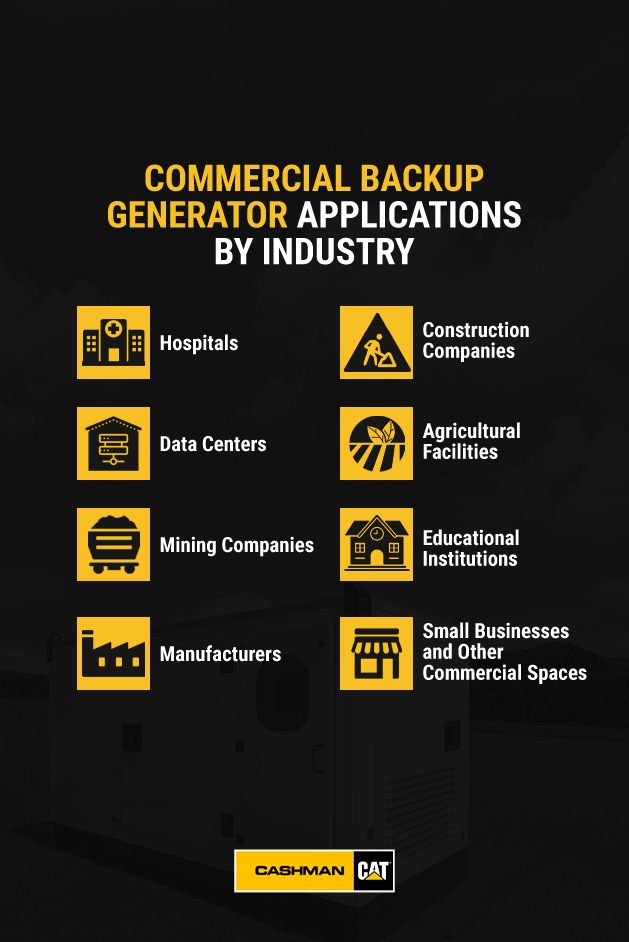
1. Hospitals
Hospitals and other health care facilities with life-saving equipment can’t afford power outages. A blackout could be catastrophic if it shuts down ventilators, oxygen delivery systems, and other life support devices. Operating rooms’ lights, magnetic resonance imaging (MRI) machines, and X-ray devices could shut off mid-task. Hospitals need their instruments to operate at all times, both to save lives and quickly diagnose ailments.
Many widescale blackouts correspond with natural disasters. This scenario heightens the need for backup power. With an influx of people needing emergency care, a hospital needs to operate at full capacity.
Health care is one of the few industries that requires backup power by law. Both the National Fire Protection Agency (NFPA) 110 standard and the Joint Commission on Accreditation of Health Care Organizations (JCAHO) regulate standby generators in health care settings. Legally, hospitals must restore power to life-safety equipment within 10 seconds of an outage. That necessitates commercial generators sized to run every piece of equipment in the facility.
More sensitive instruments can’t afford any blips in power and must connect to uninterruptible power supply (UPS) systems. These systems provide power to designated devices for a few seconds while the backup generator starts up.
2. Data Centers
Data centers store expensive servers and related equipment, alongside terabytes worth of invaluable data. Here, a power outage could cause anything from a downed website to permanent data loss. Meanwhile, data centers consume extreme amounts of energy. Added together, the world’s data centers use 205 terawatt-hours of electricity each year, or 1% of the world’s annual energy consumption. Sometimes, these energy-hungry businesses need permanent generators for their daily operations. Prime generators help data centers avoid overloading the power grid.
As a data center industry standard, these businesses guarantee 99.9% uptime, making a power outage unacceptable. When the power supply gives out, these facilities need generators to kick on seamlessly by using automatic transfer switches. Like hospitals, data centers also rely on UPS devices to prevent interruptions.
3. Mining Companies
Mines and quarries are usually far from the regular power grid. That means mining companies must create their own microgrid with prime power generators. The industry prefers diesel generators, while mining operations extracting copper, iron ore, gold, and silver may use natural gas. Caterpillar has developed generators specifically for the coal mining industry, which run on coal mine methane (CMM). Reusing the mine’s natural gases improves safety, mitigates carbon dioxide emissions, and reduces electricity costs.
4. Manufacturers
Downtime during scheduled production costs manufacturers immensely. It can ruin works in process and stored inventory. Meanwhile, the plant’s many employees sit idle during their typically busy shifts, and automation that keeps the floor running at peak efficiency is suddenly inoperative. An unexpected blackout can also damage machinery that can’t power down as it should. Manufacturers work on tight deadlines, and unplanned downtime throws them behind schedule. Many factories run 24 hours a day, so any outage poses a concern.
One of the most common industrial generator applications is in manufacturing. Since production plants have lots of equipment and heavy machinery, they need commercial generators to restore power and keep production chugging away. Some manufacturers power their essential equipment. Others require generators to keep the entire facility running without interruption. Either way, these facilities also benefit from automatic transfer switches, which restore power even when no one is on-site.
5. Construction Companies
Construction companies are more mobile than other commercial businesses. On new builds, they must do substantial work before hooking up a building to the power grid. As they travel from site to site, they need reliable, heavy-duty generators to supply their power tools and equipment with the needed energy.
Construction companies rely on mobile commercial generators. These machines can follow the company wherever needed, and their rigid construction and heavy-duty wheels can traverse uneven terrain and handle the harshest job site conditions. Sometimes, the best generator for the job is a portable commercial generator. Other times, it’s a larger generator on a mobile trailer that can move around the site. Long-term projects sometimes use stationary generators capable of generating vast amounts of energy.
6. Agricultural Facilities
Interruptions in power can sometimes cost an entire year’s harvest. A prolonged outage might leave a greenhouse without lights or humidifiers during a critical stage of plant growth. It could shut down harvesting and processing equipment, forcing a crop to grow overripe in the field. Even an hour of no power can cause a farm to miss a watering or feeding time.
Losing livestock or crops due to an outage can be devastating. A backup generator can prevent many of these complications. Meanwhile, many farms operate off the grid, meaning they need an on-site generator running full time. Caterpillar has innovative biogas generator solutions that can turn prime or backup power generation into an asset. Biogas is a methane and carbon dioxide byproduct of many agricultural processes. Biogas generators let farms turn their harmful waste into clean energy.
7. Educational Institutions
Another one of the most common commercial generator applications is in the education sector. Schools may host hundreds or thousands of students and staff members on a given school day. With so many people in the building or on campus, having a constant power supply is a safety concern.
If an elementary school loses power in the middle of the day, they can’t send kids home to empty houses. If a college campus loses power, their students could be stuck in their dorms without lights or air conditioning. Students could also get locked out of buildings or rooms with electronic access systems.
Large educational facilities have high electricity requirements. They draw power from equipment in the science labs, the cafeteria’s commercial ovens, the large, climate-controlled buildings, and everything in-between. Running generators during normal peak energy usage lets universities lower their usage charges.
Many educational facilities are also concerned with their environmental impact. As a result, they sometimes prefer natural gas generators. The fuel burns cleaner, creating safer air for students and educators and reducing harmful emissions.
8. Small Businesses and Other Commercial Spaces
Small businesses, offices, and other commercial environments also need reliable power for their daily operations. Many rely on computers, telephones, printers, and other office equipment to run smoothly. When the power cuts out, staff members can’t do their jobs. Customers can’t call the office or receive swift replies over email. For service industry companies, having no lights or power means they can’t serve customers. In some small businesses, like grocery stores, pharmacies, and restaurants, no electricity means any refrigerated products will go bad.
Small businesses and office buildings can prevent these challenges by installing permanent generators. These machines come in various wattage capacities, meaning they can power a small retail space or large office park. With an automatic transfer switch, the power comes back on seconds after an outage. No one has to take their foot off the gas, and companies can continue business as usual.
How Cashman Equipment Can Help You Find the Right Generator
Finding the right generator for your business, industry, and unique application can be complex. You must select a fuel type and energy output that meets your needs, applications, and budget.
At Cashman Equipment, our extensive collection of commercial generators includes new, used, and rental options. Our commercial Cat® generators are reliable for numerous industrial applications and commercial properties. Besides diesel and natural gas generators, we also offer accessories such as generator control panels, fuel tanks, enclosures, distribution boxes, automatic transfer switches, and cables. Our extensive inventory, combined with our network of power generation resources, means we have or can source the right generator for your business.
We also understand that selecting a generator requires careful planning. As experts in Cat equipment and commercial generators, we can help. We strive to be your partner, helping you find the generator that meets your needs and energy requirements. We answer all your questions, recommend sizing, and provide all the after-purchase support you need. A backup generator is only as good as the maintenance it receives, which is why we offer timely repairs and scheduled service.
Request a Quote or Visit Cashman Equipment Today
For more information on our Cat generators, contact Cashman Equipment online or call us at 800-937-2326. To see our equipment yourself, visit one of our stores across Nevada and the Eastern Sierras.


